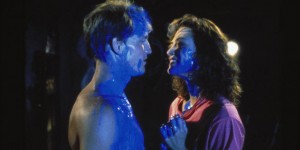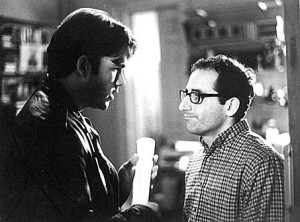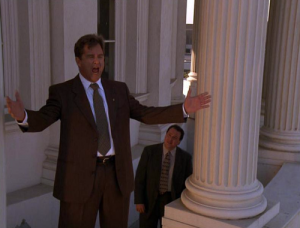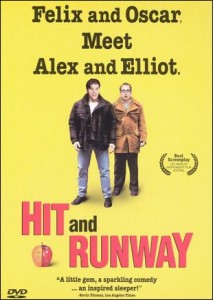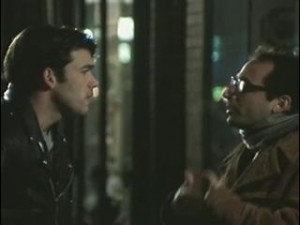From the Chicago Reader (September 7, 2001). — J.R.
Hit and Runway
**
Directed by Christopher Livingston
Written by Jaffe Cohen and Livingston
With Michael Parducci, Peter Jacobson, Judy Prescott, Kerr Smith, Hoyt Richards, John Fiore, and J.K. Simmons.
Hit and Runway — a comedy about a straight aspiring screenwriter in Greenwich Village taking on a gay playwright as a writing partner — comes from the writing team of Jaffe Cohen, who’s gay, and Christopher Livingston, who’s straight (he also directed). I knew nothing about this semiautobiographical movie until I saw it and nothing about the filmmakers until I looked at the press book, and I was fascinated to learn how semi the autobiographical aspects were.
That this movie exists at all deserves some consideration. It won a couple of festival prizes for best screenplay in 1999 and was copyrighted in 2000. I assume one reason it’s taken so long to get released — apart from being an independent feature without the clout of a major studio behind it — is the way it defies the assumptions of most publicists by refusing to address itself to either a straight or a gay audience to the exclusion of the other. It might not seem subversive for gay and straight viewers to watch the same comedy at the same time or even to laugh at the same jokes, but apparently this possibility conflicts with the way the big studios think about us as customers.
The compulsion of market analysts to divide audiences by race, ethnicity, nationality, age, gender, and sexual preference before they even set foot in a movie theater has had some grim and infuriating consequences. For example, DVDs are made to be sold in different “regions” or “territories” that are defined according to nationality, and as a result we can’t play many French or English DVDs in this country — even if they’re DVDs of American movies in their original language, as they most often are — without a special player. (For the record, you can order one of these players fairly cheaply — try www.raite715.com or eBay.) When I was programming the one I bought to play DVDs from other regions, my screen informed me, “You shouldn’t to be here” — though of course the pleasure of doing something “forbidden” only added to the allure. I should add that Europeans don’t face the same nonsense when playing American DVDs.
The industry’s basic idea seems to be that we consumers should conform to our prescribed demographic profiles and not step outside our prescribed regions and options. Say we’re interested in acquiring a DVD of The Second Civil War, the second and funniest feature in Joe Dante’s wonderful “war trilogy,” which begins with Matinee and ends with Small Soldiers (it was made for American cable and shown last year as part of the Chicago International Film Festival’s Dante tribute). Well, we’re out of luck, because it’s available only in France, which is part of “Region 2,” along with the remainder of Europe, Japan, South Africa, and the Middle East. We’re restricted to DVDs made for “Region 1,” which encompasses only the U.S. and Canada.
Insulting decisions of this kind are made on our behalf remarkably often, though they’re invisible to most of the public — as they’re supposed to be. And they’re often made just to simplify ad campaigns and bookkeeping — based on the assumption that different categories of viewers require separate ads and that publicists are capable of “defining” us and our tastes in the first place. While I was watching Hit and Runway I began to wonder what would happen if “gay” and “straight” movies on DVD were assigned to separate regions, and I decided that if they were, movies like Hit and Runway would never get financed. So I guess I shouldn’t complain about having had to wait a couple of years to see it.
The main weakness of Hit and Runway as a comedy isn’t its capacity to come up with funny ideas — it’s specifically good at satirizing callow and demographic film-industry thinking — but its capacity to sustain and develop those ideas. Hoyt Richards, for instance, playing a popular movie action hero named Jagger Stevens, does a hilarious impersonation of Clint Eastwood, but he loses some of his edge when the plot puts his character through some improbable or at least forced paces. The two lead actors fare much better, though again things become less certain once they move beyond situations into a proper story.
Alex Andero (Michael Parducci), the youngest son in an Italian-American family, is put to work in the family business — a Greenwich Village cafe — after the father dies. Living in the cafe’s basement and taking a screen-writing course, Alex gets a shot at the big time when he’s given the opportunity to write a script on spec for Stevens. His ineptness as a writer leads him to one of the cafe’s customers — a shy, clumsy, gay, Jewish playwright named Elliot Springer (Peter Jacobson) who has a crush on a struggling actor named Joey (Kerr Smith) who works at the cafe. (One comic theme that’s developed: Joey is especially turned on by Jewish men.)
A good bit of the comedy stems from the initial intellectual mismatch and eventual friendship between this writing team, as well as from the way their separate romances — Elliot with Joey and Alex with Gwen (Judy Prescott), who’s also taking the screen-writing class — influence and inflect their screenplay in progress. Despite some familiar moves — in their script and in this movie — what gives Hit and Runway some charm, and steers it away from becoming a one-joke comedy, is the desire of Cohen and Livingston to define the characters of Elliot and Alex as more than the sum of their sexuality. As Cohen puts it in the press book, “Strangely enough, the issue of sexual identity eventually became only a small part of the overall movie because, in reality, who we sleep with doesn’t describe all that much about who we are.”
It’s worth noting that few of the differences between Livingston and Cohen and their screen counterparts relate to sexuality. Livingston is the son of Alan Livingston, president and chairman of the board at Capitol Records in the 60s, and Hollywood actress Nancy Olson; he’s also the nephew of songwriter Jay Livingston, whose hits include “Mona Lisa” and “Que Sera, Sera.” In addition, he’s a composer and musician, and he played keyboards on and cowrote (with Frank Piazza) most of the songs on this movie’s sound track. Like Alex, he wound up working in his family’s business, though in a very different fashion.
Cohen, a comedy writer and performer, is identified in the press book as “the first openly gay male stand-up comedian to appear on national television in the United States.” His one-man show The King of Kings and I was reworked as a book; he also cowrote a book called Growing Up Gay: From Left Out to Coming Out and is identified as “a flamboyant party guest in James L. Brooks’s As Good as It Gets.” This appears to make him more self-consciously gay than Elliot, though Elliot’s play — submitted by Alex as his own writing sample — is called Chicken of the Sea. Could this be a pun relating to Elliot’s crush on a younger man? Maybe. It does happen to be the title of the thesis film Livingston made when he was at New York University’s Graduate Film School, a film that won him several awards. All of which suggests that the connections between reality and screen writing are probably much more complicated than we generally assume.

